Tales of a journalist
Oh misery me
3 December 2014 | Non-fiction, Tales of a journalist
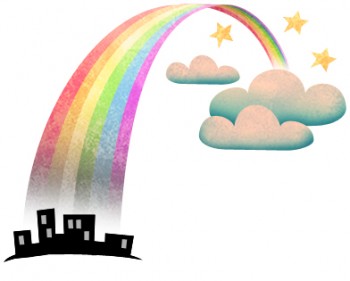
Illustration: Joonas Väänänen
The Finnish media never pass up an opportunity to post articles on our favourite miseries, says columnist Jyrki Lehtola: Finns are great at wallowing in self-denigration, so it sells well. And life is always better somewhere else, isn’t it? At least in ‘Europe’ it is
They should never have let us Finns into Europe. Or North America, South America, Australia, Africa, Asia.
Another Nordic country might perhaps suit us, or Albania or Russia. We could visit them.
Europe doesn’t suit us. Europe makes us even more stupid than we already are. Europe makes us think less of ourselves and more of other people. More…
Journalist 3.0
22 May 2014 | Non-fiction, Tales of a journalist

Illustration: Joonas Väänänen
As the world becomes more and more difficult to understand, the media, strapped for cash and forced for reduce expenses, sack their expert writers. Jyrki Lehtola assesses the new breed of cut-price journalists
Some time in the distant past it was possible for a reader to reflect that here was an educated journalist writing pithily. It would be nice to know more of his or her thoughts.
There used to be talk of such concepts as the ‘objective truth’, and editors shunned talking about themselves, or even speaking or writing in the first person. There was just the world, which the journalist, the conduit of truth, conveyed to the public.
Now, although most of us would prefer to know nothing about journalists and their private lives, journalists have brought their lives strongly into the public arena. Objectivity is dead; there are merely millions of subjects who perhaps share the same experiences, perhaps not, and, misled by some idealised concept of community, we are the beneficiaries of journalists writing about what it’s like to be a mum, how challenging life as a mother and journalist can be. More…
Like it, or else
23 January 2014 | Non-fiction, Tales of a journalist

Illustration: Joonas Väänänen
Hitting the ‘like’ button is not only boring but also working its way from Facebook deeper into society, says Jyrki Lehtola. Surely there must be some other way of solving the world’s problems?
At the end of the autumn the theatre critic of the Helsingin Sanomat newspaper panned Sofi Oksanen’s stage adaptation of her novel Kun kyyhkyset katosivat (‘When the doves disappeared’, 2013).
That’s life. Artists struggle with their projects, sometimes for years. Then a critic takes a glance at the result and crushes it in a matter of hours.
Then there’s a huff about unfairness, the use of power and all the things artists blow off steam about when they feel that their creations have been treated unfairly. The debate is held between injured authors and sometimes the critic, but generally few others participate, and just as well. More…
What have brains got to do with it?
17 October 2013 | Columns, Tales of a journalist
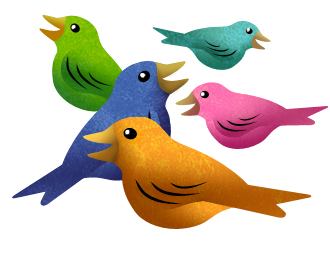
Illustration: Joonas Väänänen
Pondering his changing profession once again, columnist and media critic Jyrki Lehtola feels compelled to present a brief history of the media
Not long ago a certain media company invited me to participate in a panel on brainprints.
I didn’t know what they were talking about, so I agreed. At most I thought it was about the engram left in our collective psyche that yes, we used to have this sort of print media thing that told us what the world was like.
And then we didn’t – look at this picture of print media on my iPad, kids, isn’t it cute?
That wasn’t what it was about at all. Brainprint means all the ways the media can influence us as consumers. In other words, this is one more conversation the media has with itself to convince itself that it has a role to play.
There we sat around a long table once again talking about whether the media is a mirror or a window when maybe we should have been talking about the pile of glass on the ground and whether someone shouldn’t clean it up before someone hurts themselves. More…
Grown-up talk
13 June 2013 | Non-fiction, Tales of a journalist

Illustration: Joonas Väänänen
Would you say this to someone face to face? No? But anonymously, in writing, you do. Columnist Jyrki Lehtola takes a look at the way Finns tend to behave on the Internet
Babies. They’re cute. They have to be – they are babies after all. And their parents are lovely people, because they have those cute babies. Even they have a hard time believing how mellow and happy they are now that they have a baby.
But what happens to parents when the baby falls asleep and they get to creep off to the Internet? They completely freak out and turn into belligerent trolls. More…
The human factor
14 March 2013 | Non-fiction, Tales of a journalist
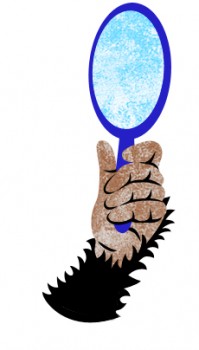
Illustration: Joonas väänänen
Columnist Jyrki Lehtola zooms in on the worst factor in the diminishing quality journalism: us. Our voice is now dominant in the media, and it isn’t a particularly pleasant one.
Have you heard the rumours about the crisis in the media yet? Or their search for a new revenue logic that consists of repeating the words ‘Internet’ and ‘money’? I’m sure you have, even though the media itself claims to be getting along fairly well and can always find some perspective on its dropping circulation numbers that tells everyone they’re doing just fine. (For example, their numbers are better than in 1898 when the paper didn’t exist. Yes, we rule!)
But that isn’t the only problem. The other problem exists in us, the readers, listeners and viewers. Social media, discussion boards, and the media itself have given us a voice, and, er, well, it isn’t the kind of voice anyone wants to hear.
It turned out we have an ugly voice, and we want all the wrong things. More…
Mind the gaffe
14 December 2012 | Non-fiction, Tales of a journalist
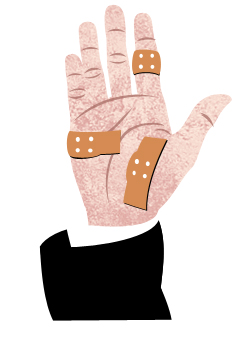
Illustration: Joonas Väänänen
Celebrating Finnish Independence Day is a serious business involving lots of handshakes and plenty of pitfalls for the unwary, observes columnist Jyrki Lehtola. But luckily there’s plenty of fun to be had for ordinary Finns in complaining about it all
When Finland makes the news, it’s usually because of a national tragedy or something odd we do. The latter ripe fodder for filling the blank pages of the international media on slow news days includes such things as the Finnish penchant for competitions in such sporting events as Wellington boot /mobile phone tossing (saappaan- / kännykänheitto) and wife carrying (akankanto).
We have another odd national tradition, although it has never received as much international recognition as the fact that we carry our wives competitively. This time- honoured custom repeats annually on the sixth of December, when we close our shops and barricade ourselves gloomily within our homes. Its name is Independence Day. More…
Celebrity boobs and other news
9 October 2012 | Non-fiction, Tales of a journalist

Illustration: Joonas Väänänen
Anyone can find the latest news and the vital information he or she requires – latest pictures of some celebrity’s breasts, the reasons why men cheat on their wives – immediately from the Internet. Jyrki Lehtola takes a look at why the printed media are in trouble
We are living in an age of newspaper death. Several publications have already closed up shop in Finland just this autumn. The most notable of these was Finland’s oldest and most influential teen magazine, Suosikki (‘Favourite’), which had been in circulation for some 52 years.
This was where several generations, particularly the boys of several generations, got all of their information about sex, where they learned how to tape posters to their walls without them peeling off, where they got information about rock stars’ drug use and favourite foods and where they learned that even if something can be expressed with a period, expressing it with an exclamation point is still preferable. More…
Summer madness
27 June 2012 | Non-fiction, Tales of a journalist

Illustration: Joonas Väänänen
In the endlessly long days of the brief Nordic summer, what could be better than to go on a bender? Jyrki Lehtola explores a quaint Finnish custom
In Finland it’s cold and dark for nine months of the year. We spend the other three months drunkenly praying that tomorrow it might be warmer and lighter – and sometimes it is.
From the perspective of the national psyche, you’d think we might have learnt to live with the cold and the dark. We might have dealt with it and turned it into something useful to us and to our continued survival. Sadly though, this isn’t quite the case. For nine months we sit indoors staring at the television, complaining that there’s never anything worth watching and waiting for those three months to come so that we can go outside again.
And when we finally get outside, we go mad. No longer are we a silent, anxious people. Well, we are, but we pretend we’re a different kind of people: one that spends its time chattering joyfully on the beach, dancing, enjoying life, discussing, debating, participating, sharing.
The arrival of summer makes us go mad. By the end of June, this silent, anxious, suicidal nation has turned into the number one samba carnival of Northern Europe. More…
Kidult culture
4 April 2012 | Non-fiction, Tales of a journalist
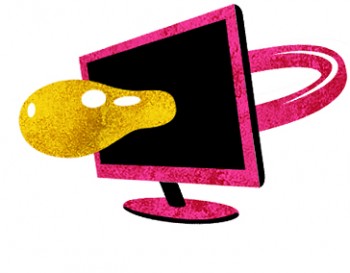
Illustration: Joonas Väänänen
Life is hard, and then you grow up. Except that you don’t really, at least if you keep watching television. Jyrki Lehtola takes a look at entertainment for the Peter Pan generation – which, he argues, is pretty much all of us
When did we start making television for children? I mean, in theory for adults (believe me, advertises, believe me: for adults!) but in practice for children?
Theoretically television is a wonderful, flexible medium less dependent on big money than the film business. Why did we let it slip out of our hands as a form of expression?
Why did we start making adult programmes for children and children’s programmes for adults? In other words, why do we make exactly the same TV programmes for everyone? More…
Hatefully yours
23 December 2011 | Non-fiction, Tales of a journalist
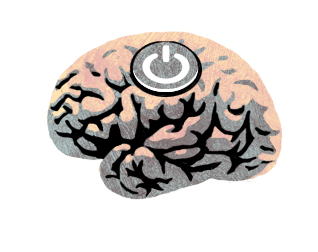
Illustration: Joonas Väänänen
In the new media it’s easy for our pet hatreds to be introduced to anyone who is interested. And of course everyone is interested, how else could it be? Jyrki Lehtola investigates
Twitter, Facebook, Twitter, Twitter, Twitter, Facebook, Twitter, how can we get the revenue model to work by using our old media, Twitter, Facebook, Twitter, Twitter, hey, what about that revenue model of ours, Twitter.
The preceding is a poignant summary of what the Finnish media was like in 2011 when the rules of the game changed like they have changed every year. And we still don’t even fully understand what the game is supposed to be. More…
Are we stupid or what?
14 October 2011 | Non-fiction, Tales of a journalist
 Are we dumbed down by the Internet? Jyrki Lehtola takes a look at who might be to blame
Are we dumbed down by the Internet? Jyrki Lehtola takes a look at who might be to blame
Because I am not a historian and Googling this topic would take more than two clicks, I do not know whether Gutenberg was accused of ruining the future of young people and making adults even stupider.
There would have been reason to. The invention of the printing press took us away from what is truly important. The world was better before Gutenberg.
People knew themselves and each other; they were connected to nature and what really matters. After Gutenberg invented the printing press, those poor people were forced to read books, creating an ever-worsening state of helplessness. More…
The politics of difference
17 June 2011 | Non-fiction, Tales of a journalist
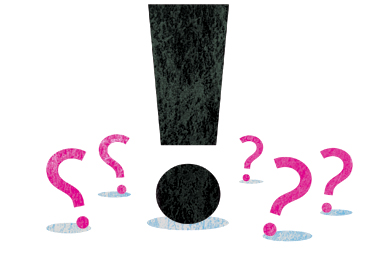
Right or wrong, my country? Illustration: Joonas Väänänen

Right or wrong, my country? Illustration: Joonas Väänänen
Big electoral turnouts are generally considered a good thing. But, writes columnist Jyrki Lehtola, in Finland the fact that the vote went up in the last Finnish general election caused a revelation. Educated urbanites and the media (perhaps near enough the same thing), are shocked by how 20 per cent of their fellow Finns think – and the ramifications caused tremors all across Europe
Listen up. Diversity is a resource. Except of course if it’s the sort of diversity that is a resource for the wrong people.
That sort of diversity isn’t the least bit nice. In Finland in the spring, we ran into the sort of diversity that even got the rest of Europe to start worrying. Out in the thickets and forests, diverse people had been springing up in secret, people of whose existence we urbanites were entirely unaware.
And they threatened to bring Europe down. Europe. Which was a bit much. More…
What are we like?
4 February 2011 | Non-fiction, Tales of a journalist
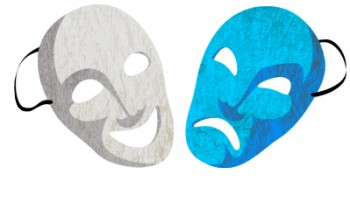
To be, or not, a true Finn? Illustration: Joonas Väänänen

To be, or not, a true Finn? Illustration: Joonas Väänänen
Elections are coming: what will the vox populi, the voice of the people, dictate? And which people will be deciding Finland’s political future? As columnist Jyrki Lehtola reports, a political debate has arisen about the ‘right’ and the ‘wrong’ sort of pollster – and the ‘right’ and ‘wrong’ kind of Finn
Finland will be holding parliamentary elections in April. We’ve been organising them every four years, like clockwork, for the past two decades, a rare example of stability in a parliamentary democracy. Finland is the European Union’s model student, and the differences between our main political parties are nearly pro forma (who wouldn’t want to protect nature? who wouldn’t want better health care?), so elections in recent years have been more like an endearing tradition than significant, world-changing events.
However, this year everything is different. The upcoming elections have forced us to look in the mirror – and we aren’t liking what we’re seeing. More…

